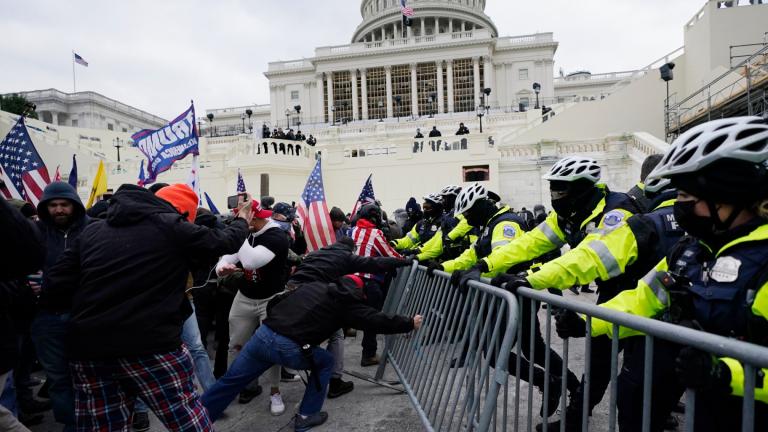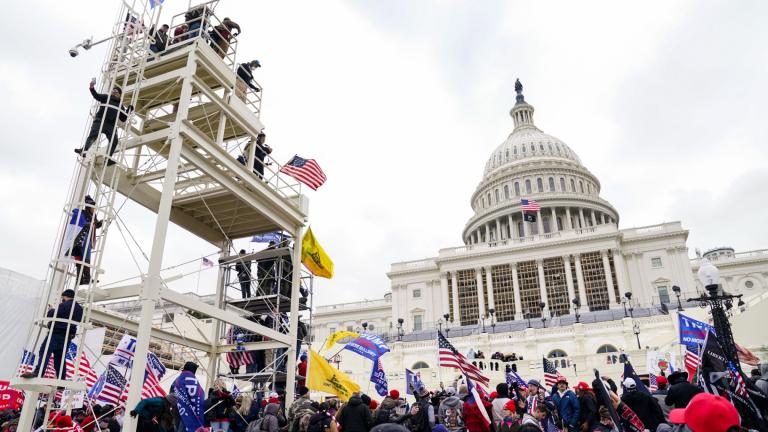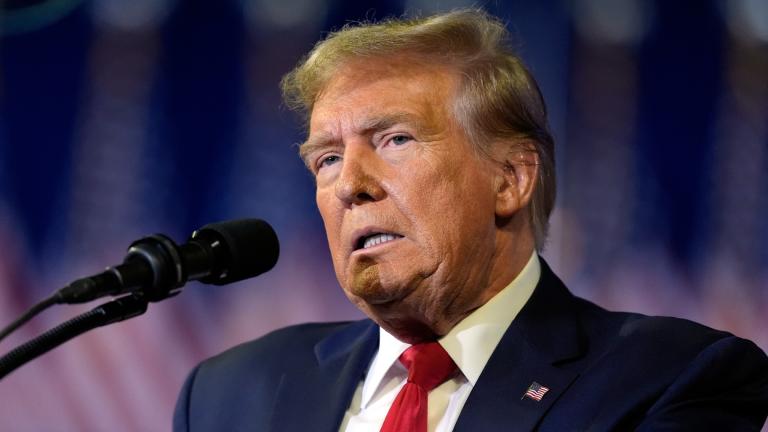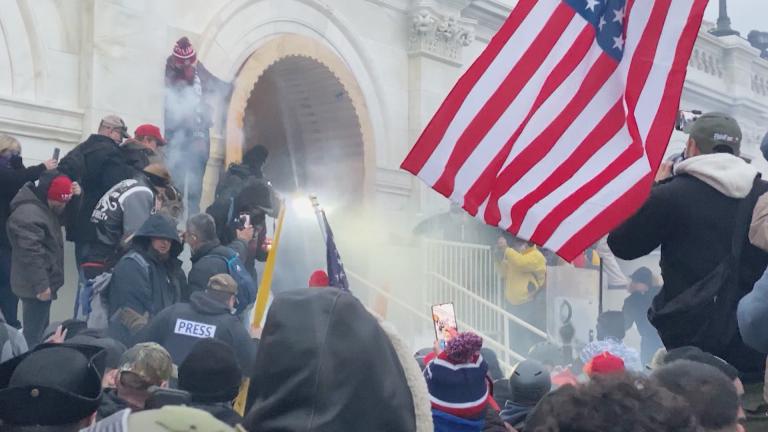Former U.S. Attorney General under President Barack Obama, Eric Holder, says that if former President Donald Trump were an ordinary citizen he would likely have already been indicted.
In an interview with WTTW News, Holder said that the FBI search of Trump’s Mar-a-Lago home and the discovery of a hoard of classified documents had increased the former president’s legal jeopardy.
“There’s no excuse for having those documents in Mar-a-Lago,” said Holder. “It clearly violates the law. The expectation is that when you leave office the documents that you have are the possession of the United States of America.”
At a rally in Mesa, Arizona, on Monday, Trump insisted that the documents were his and that they should be returned to him.
Holder, who was Obama’s AG from 2009 to 2015, says that statement could become problematic for Trump and his lawyers.
“That in a lot of ways is an admission and I’m sure his lawyers were saying ‘I wish he hadn’t said that,’” said Holder.
He also dismissed Trump’s claim that the Department of Justice and the FBI had been “weaponized” against him.
“It’s total nonsense, Merrick Garland and the people at the Justice Department I think have conducted themselves in an appropriate way,” said Holder. “They tried to negotiate with them to get the documents back. They did a whole range of things. They tried to subpoena to get the documents back before they actually went into his residence. They gave him all the respect to which his office was due. In fact, if he were a regular citizen I suspect that he would have been indicted by now.”
In his new book, “Our Unfinished March: The Violent Past and Imperiled Future of the Vote. A History, a Crisis, a Plan” Holder argues that since the Supreme Court struck down parts of the Voting Rights Act in 2013, states have sought to suppress and restrict voting rights.
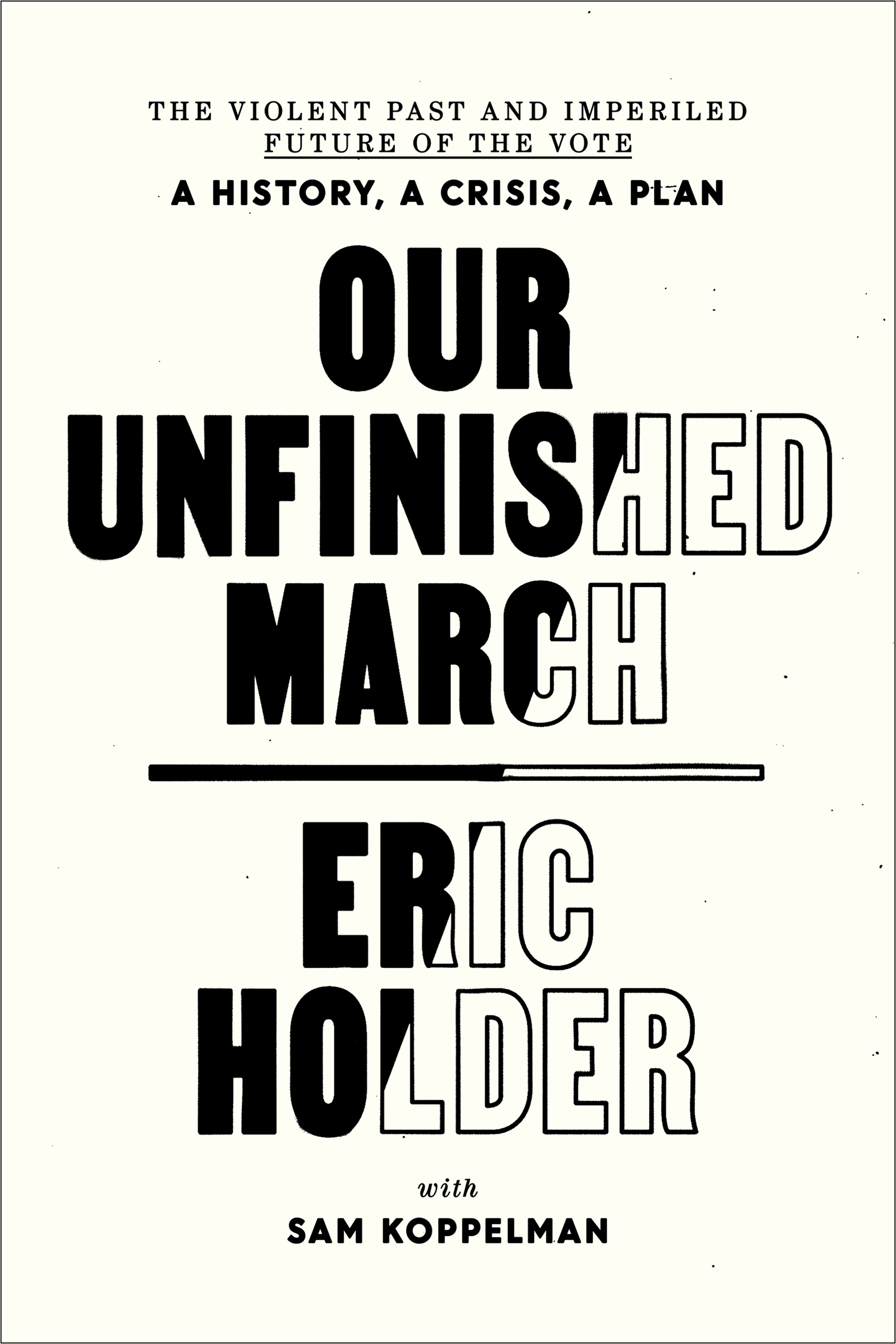
Chapter 6
January 6
The stars and bars of the Confederacy waving, for the first time, on the floor of Congress. A noose and gallows, erected outside, swaying back and forth with the wind. A police officer, beaten over the head with a Betsy Ross flag, one of 140 injured that day, while rebels in Viking horns and “Camp Auschwitz” sweatshirts desecrated the Citadel of Democracy—encouraged by the president of the United States to “walk down to the Capitol” and “fight like hell.”
Gabriel Sterling was right: President Trump’s rhetoric did end up killing people—five, in fact, not to mention at least four police officers at the scene who took their lives in the months that followed.
In its aftermath, many have tried to erase the danger of the insurrection from our memory—framing the events of January 6 as the ending of President Trump’s effort to overturn the election. And I can understand why that’s a tempting narrative to embrace. After all, it’s true that by the end of the night, once police officers had swept the Capitol for bombs a final time, Congress had reassembled, counted up the votes, and declared that Joe Biden would be the next president of the United States.
“To those who wreaked havoc in our Capitol today, you did not win,” declared a triumphant Mike Pence, whom the insurrectionists had threatened to hang because he hadn’t been willing to overrule the Electoral College and install President Trump for another four years. (President Trump, unsurprisingly, sided with the insurrectionists. Ten minutes after the vice president had been evacuated from the Capitol with his life under threat, @realDonaldTrump laid into him: “Mike Pence didn’t have the courage to do what should have been done to protect our Country and our Constitution.”)
Over the weeks that followed, leaders in the GOP initially condemned President Trump in stronger terms than they ever had before—which, of course, isn’t saying all that much. “Count me out,” Senator Lindsey Graham declared. “Enough is enough.”
Mitch McConnell admitted that President Trump had committed a “disgraceful dereliction of duty.” In total, ten Republican congressmen and seven Republican senators, though not Graham or McConnell themselves, voted to convict President Trump of inciting the events of January 6, a bipartisan impeachment the likes of which our country had never seen.
This is one way the history books could tell the story of January 6—as a moment when politicians put partisanship aside to defend our democracy; as a moment when our institutions overcame an insurrection. But the real story of that day isn’t how our country came together to make sure this coup attempt failed. It’s how close it came to succeeding—and how quickly, in states across the country, Republicans began working to make sure that, next time, it could. …
After all, as I mentioned in the note at the beginning of the book, this Trumpified Republican Party just isn’t all that into democracy—regardless of its impact on their electoral prospects—because their priority isn’t exercising the will of the people; it’s accruing the power to implement their agenda whether or not it’s aligned with the will of the people.
And so within days of President Biden’s inauguration, in states across the country, Republican legislatures began rolling back the progress we’d made on turnout under the guise of protecting future elections from voter fraud—in the process, lending credibility to the “Big Lie” that President Trump had used to justify his attempted coup. In fact, according to the Brennan Center, by June 2021, legislatures had introduced more than 380 bills that would have restricted access to the polls—dozens of which became laws across swing states like Florida, Georgia, and Nevada, as well as conservative strongholds like Idaho, Wyoming, and Kentucky.
Many of these bills were designed to make it harder to vote by Others made it more difficult to vote in person. One bill, in Georgia, criminalized offering food or water to voters waiting in line to cast their ballots, a seemingly random form of suppression that starts to make more sense when you remember how much longer lines are in predominantly Black neighborhoods across Georgia than they are in predominantly white ones.
By October 2021, thirty-three of these laws were enacted across nineteen states. And it’s hard to imagine many of them being struck down by the courts—not only because of the ruling in Shelby County, which continued to limit the Justice Department’s ability to fight voter suppression, but also because in the 2021 case Brnovich v. Democratic National Committee, the Supreme Court’s conservative majority gutted the Voting Rights Act even further.
In his majority ruling, Justice Samuel Alito demonstrated a radical understanding of voting rights. Unlike in past decisions, where the court had consistently expressed a belief that barriers to the ballot should be looked at as suspect, Justice Alito’s opinion attempted to normalize them. Walking outside your house in order to vote is already an obstacle, he argued, so why should we punish state legislatures for making it even harder to cast a ballot?
It’s a decision that will ultimately leave voting rights almost exclusively in the hands of the lower courts—and at this point, if they decline to strike down suppressive bills, I doubt the Supreme Court will overrule them.
Chapter 7
And if we fight for voting rights, it’s what we have a chance to do for our country in the years ahead. This raises a question: What does it look like to make America a democracy? I believe the answer has two parts.
The first is fixing our elections. Because if the United States is going to be a representative democracy, then all our citizens need to be able to vote—and they shouldn’t be stopped from doing so based on where they live, what they look like, how much money they have, who they’re likely to vote for, or whether they can afford to wait in line.
The second is fixing our institutions. Because right now— with an unrepresentative Senate, an unnecessary and anti-democratic Electoral College, a gerrymandered House of Representatives and panoply of state legislatures, and a stolen Supreme Court—the ideal of every person having an equal say in our democracy, the idea of “one person, one vote,” is far from a reality. And that would still hold true, even if we fixed the problems with our elections, even if we had 100 percent voter turnout.
Because the reason our institutions are broken, the reason they overrepresent the interests of one segment of our population, is that this is how those who enslaved people who looked like me—and who guided the writing of the Constitution—designed them to work.
But here’s the thing: The principal way to reform those institutions is by passing legislation, and the way to pass legislation is by winning elections, and the way those in favor of democracy are going to win elections is if those contests are a fair fight.
So that’s where I’m going to start, with the solutions to the problems plaguing our elections, which boil down to one key principle, the same principle that guided Chris Hollins: making it easier to vote
Excerpted from “Our Unfinished March” by Eric Holder with Sam Koppelman Copyright © 2022 by Eric Holder. Excerpted by permission of One World. All rights reserved. No part of this excerpt may be reproduced or reprinted without permission in writing from the publisher.


